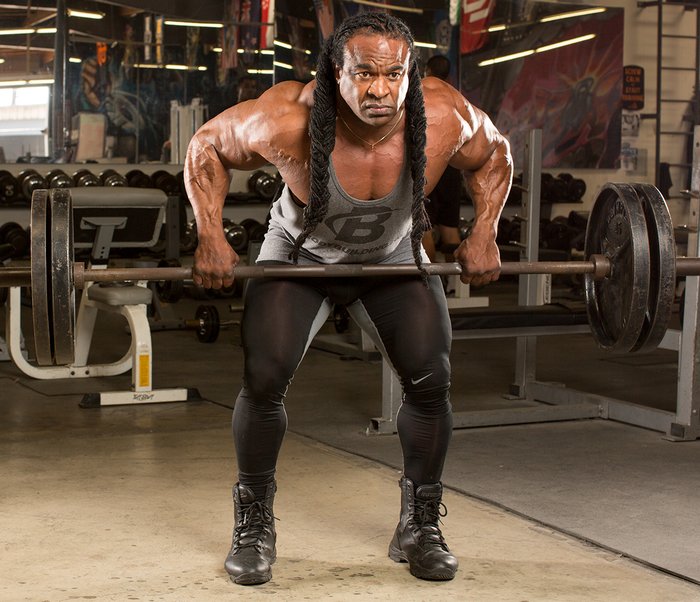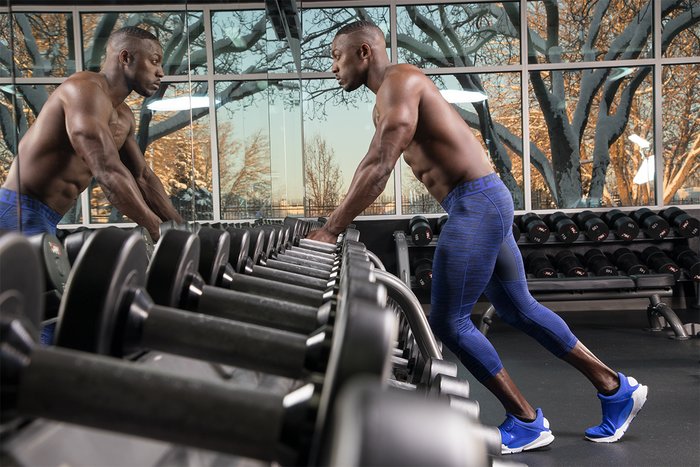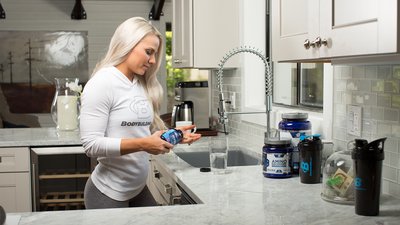Peanut butter and jelly. French fries and ketchup. Movies and popcorn. Sure, you can have one without the other, but why would you? The two just make each other better.
The same can apply to supplements! While there have been numerous studies looking into the efficacy of specific ingredients, many have also looked at supplement pairings and determined that certain couples help each other do their job more effectively than they do on their own.
Looking to keep it simple and get the most out of every supp purchase? Then consider grouping these together!
Best Combo for Size and Strength: Creatine + Beta-Alanine
Creatine is renowned for its ability to increase muscle strength and size. It's used by gym-rats, competitive athletes, and everyone in between for its many benefits. Combining it with the high-intensity performance booster beta-alanine may improve your results.

Creatine helps to saturate your body's stores of phosphocreatine (PCr) for greater exercise intensity and better post-workout recovery. Beta-alanine raises carnosine levels, which helps buffer hydrogen ions so you can push harder before hitting failure.
Together, the two not only improve exercise performance, but add muscle mass and reduce body fat—much more so than if you took creatine alone, according to one study.[1]
Products Containing Creatine + Beta-Alanine
Best Combo for Recovery: Casein + Probiotic
The slow-digesting protein casein is best known for its ability to provide your body with a steady stream of amino acids to support muscle growth and recovery. For many people, probiotics can also improve digestion and nutrient uptake. Put the two supplements together, and you can experience both reduced muscle soreness and faster post-workout recovery.

In a recent two-week study at the University of Tampa, researchers divided male weightlifters into two groups. One group consumed casein alone, while the other consumed casein plus the probiotic bacteria Bacillus coagulans. At the end of the study, researchers found that the protein-plus-probiotics group experienced less muscle soreness, faster post-workout recovery, and could maintain their physical performance longer following a high-intensity exercise.[2]
Casein and Probiotic Products
Best Combo for Focus: Caffeine + L-Theanine
I probably don't need to sell you on caffeine. Whether you brew it up at home, buy it at a coffee shop, or get it in a scoop of pre-workout, caffeine is already powering much of the world through workdays and workouts.[3]

To get the most mental benefit out of this extra energy, consider L-theanine, an amino acid found in tea, many pre-workouts, and on its own. L-theanine is unique in that, by lowering alpha-wave activity, it can keep the brain both highly alert and relaxed.[4]
Combining the two has been shown to improve alertness, focus, and even mood.[5] To you, this could mean feeling the alertness of caffeine without unwanted side effects like headaches, jitters, or the post-caffeine-high crash. Magic!
Products Containing Caffeine + L-Theanine
Best Combo for Weight Loss: Green Tea Extract + Caffeine
Fat-loss supplements regularly include caffeine because of the way it can increase both energy expenditure and the rate of fat breakdown during exercise.[6,7].

While these results are impressive enough on their own, adding the primary ingredient in green tea extract, EGCG, can boost your metabolic rate even more, resulting in more calories burned over time.[8]
Products Containing Green Tea Extract + Caffeine
References
- Hoffman, J., Ratamess, N., Kang, J., Mangine, G., Faigenbaum, A., & Stout, J. (2006). Effect of creatine and ß-alanine supplementation on performance and endocrine responses in strength/power athletes. International Journal of Sport Nutrition and Exercise Metabolism, 16(4), 430-446.
- Jäger, R., Shields, K. A., Lowery, R. P., De Souza, E. O., Partl, J. M., Hollmer, C., ... & Wilson, J. M. (2016). Probiotic Bacillus coagulans GBI-30, 6086 reduces exercise-induced muscle damage and increases recovery. PeerJ, 4, e2276.
- FDA. (2007, Fall). Medicines in my Home: Caffeine and Your Body. Retrieved from www.fda.gov/downloads/UCM200805.pdf
- Owen, G. N., Parnell, H., De Bruin, E. A., & Rycroft, J. A. (2008). The combined effects of L-theanine and caffeine on cognitive performance and mood. Nutritional Neuroscience, 11(4), 193-198.
- Haskell, C. F., Kennedy, D. O., Milne, A. L., Wesnes, K. A., & Scholey, A. B. (2008). The effects of L-theanine, caffeine and their combination on cognition and mood. Biological Psychology, 77(2), 113-122.
- Costill, D. L., Dalsky, G. P., & Fink, W. J. (1977). Effects of caffeine ingestion on metabolism and exercise performance. Medicine and Science in Sports and Exercise, 10(3), 155-158.
- Arciero, P. J., Bougopoulos, C. L., Nindl, B. C., & Benowitz, N. L. (2000). Influence of age on the thermic response to caffeine in women. Metabolism, 49(1), 101-107.
- Dalbo, V. J., Roberts, M. D., Stout, J. R., & Kerksick, C. M. (2008). Acute effects of ingesting a commercial thermogenic drink on changes in energy expenditure and markers of lipolysis. Journal of the International Society of Sports Nutrition, 5(1), 6.

